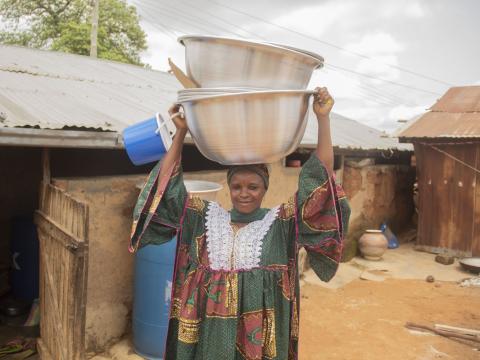Afishata, a Rural Woman Empowered through Financial Inclusion in Ghana

Story by: Priscilla Adjei-Laryea, Grants, Marketing & Communications Specialist
Afishata, a dedicated businesswoman and farmer from Nabori in Ghana's Savannah Region, exemplifies the transformative impact of linking Village Savings Groups (VSGs) to formal financial services. Together with her husband Abu, Afishata runs a thriving 8.5-acre farm. Their crops include groundnuts, maize and bambara beans, with groundnuts being their main source of income, fetching 500 cedis per sack and yielding 40 sacks per harvest.
Despite their agricultural success, Amidu and Abu faced challenges common to rural communities: limited access to finance for expansion and education for their four children, each with their own aspirations.
Afishata's journey took a significant turn when she joined the Nabori Savings for Transformation (S4T) group. It was enrolled in the Village Savings and Loans Associations (VSLAs) Linkage Programme, supported by World Vision Ghana and Vision Fund Ghana and funded by the World Bank through the Ministry of Finance. This initiative increased financial inclusion by linking VSLAs to formal financial service providers. Through the linkage programme, Afishata gained access to formal savings accounts, allowing her to save safely and earn interest, thereby building financial resilience. She also gained access to credit and loans based on her savings history and group credibility, enabling her to invest in the productivity of her farm and the education of her children.
Further, linkage with Financial Service Providers (FSPs) like the Tizaa and Bonzali rural banks has improved Amidu's financial literacy broadened her understanding of effective money management. The VSLA linkage not only diversified her financial tools but has also improved the sustainability of the group by promoting better financial management and accountability practices. During the lean agricultural season, Afishata trades in various household items that are in high demand in Nabori. This ensures that their seed money is always generating a return.
Afishata's involvement in the S4T group has also empowered her economically and strengthened social capital within her community. By sharing financial goals and mutual support with other VSLA members, she contributes to local economic development through increased agricultural productivity and employment opportunities. Afishata employs farm workers and pays for agricultural extension services for her farms.
Today, Afishata stands as a beacon of success in Nabori, demonstrating how linking VSLAs to formal financial systems can alleviate poverty, empower women, and foster sustainable development in rural communities like hers. Her story highlights the profound impact of financial inclusion initiatives in unlocking opportunities for individuals and communities to thrive.